
Starting at Sheffield Hallam
Welcome
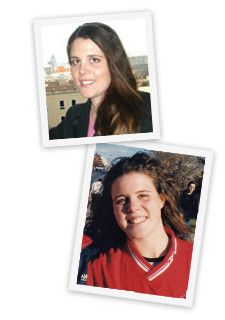
1/6
Dr Camille B. Kandiko Howson:
Author
Where did you go to university? Cornell University (USA), where I studied English and Classics. I did my Master's degree in Higher Education Administration at the University of Pennsylvania (USA), and was awarded my PhD by Indiana University (USA).
What did you enjoy most about higher education? Meeting people from around the world with completely different experiences than I had, and still being friends with them today.
What surprised you most about higher education? Learning as much from figuring out 'how to go to university' as I learned in the classroom.
What one piece of advice would you give students today? Join in! If there's something you're interested in or would like to learn more about, take a class, join a club or start a society. It is amazing where following your passions can lead you, at university and in life afterwards.
Dr Camille B. Kandiko Howson is Academic Head of Student Engagement at King's College London. She has worked over the last decade on improving the student experience in higher education, working with students and staff in the UK, US, Ireland, Australia, Hong Kong and South Africa.
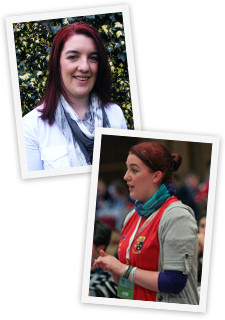
2/6
Caitríona O'Driscoll:
Reviewer
Where did you go to university? University College Cork, Ireland.
What did you enjoy most about higher education? I was given many opportunities to explore my different interests and contribute to the University community.
What surprised you most about higher education? Though I found my course very interesting I learned so much more about the world and myself through my extra curricular activities, from organising a trip to Paris for 60 chemistry students to being a part of the Hot Beverage Appreciation Society which is still going strong.
What one piece of advice would you give students today? Investigate every opportunity you are tempted by, be it to take a year abroad, to be the student rep on the library committee, to start up a small business with some other students or something completely different.
Caitriona (Cat) is currently a Research Assistant for The National Forum for the Enhancement of Teaching & Learning in Higher Education. A graduate in Microbiology from University College Cork (UCC), Cat served as an Executive Committee member for the European Students' Union. Cat was an active member of the Student Council and Executive during her studies, and in 2011 she was elected to the UCC Students' Union as Vice President for Education. Cat was elected to the Officer Board of the Union for Students in Ireland for two terms, serving as the Vice President for Academic Affairs and Quality Assurance.
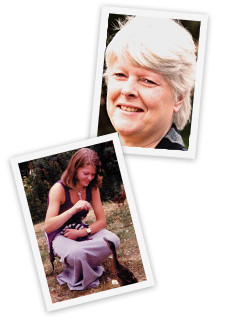
3/6
Elisabeth Dunne:
Lead Advisor
Where did you go to university? The 'concrete jungle' of Lancaster University, which is topped by white painted spires and jagged white skylines, surrounded by countryside, close to the city, not far from the sea. I found it inspirational.
What did you enjoy most about higher education? I still remember it vividly – the excitement and fear of mixing with so many new people, wondering if I would ever cope with the timetables and books. We demonstrated and fought for our rights and the rights of others. As a French student, I managed to get a year of teaching in France which was hard work, but I travelled to so many beautiful French cities, was offered holiday jobs with French families, fell in love.
What surprised you most about higher education? I remember in my finals thinking: "Can I really be sitting an exam on something as wonderful as 'the role of posters in Modern French Art'?" Nonetheless, what surprises me the most is that I have dedicated so much of my career to improving learning and teaching in universities – that was not in my mind when I started out on my own journey into higher education, but it has been worth it every step of the way.
What one piece of advice would you give students today? Whatever your age or background or context, you can use this time to explore, to find out more about yourself, to immerse yourself in your study, and to grow academically and personally toward the person you want to be.
Elisabeth is Director of REACT at the University of Winchester. Elisabeth's entire career has been focused on helping students to learn. She is passionate about enabling students to make the most of their time at university, pushing them into new ways of learning and thinking, and supporting them on their exciting and challenging journeys through everything that is special about higher education.
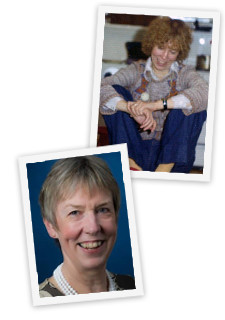
4/6
Professor Ella Ritchie OBE:
Expert Advisor
Where did you go to university? I went to Lancaster University, where I initially studied History with French and Politics but then switched to focus on politics. I got my Doctorate at LSE.
What did you enjoy most about higher education? I enjoyed everything about going to Lancaster University... after all it was the 1960s! I particularly liked the freedom and the broadened horizons. Lancaster was very small at that time so it meant we all mixed together socially.
What surprised you most about higher education? As a history student I was surprised both by the wide sweep of world history and the emphasis on social history, having previously taken a very traditional approach to history at school. I switched to study politics, which gave me an enduring interest in the interconnectivities between society and the state.
What one piece of advice would you give students today? Be confident, be enthusiastic and always learn from others.
Professor Ella Ritchie OBE, Emerita Professor of Politics at Newcastle University, has had a long career as an academic and senior manager. She has a wide experience of Teaching and Learning, first as a teacher, then as a Dean and Pro Vice Chancellor for Teaching and Learning and Deputy Vice-Chancellor at Newcastle. She has participated in many initiatives nationally to improve the student experience. She is Chair of the National Realising Opportunities project which is designed to widen access to research intensive universities through a programme that includes e-mentoring and supported study. She has an expertise in the internationalisation of Higher Education and is a European Higher Education Area expert and is currently working on projects in China and the wider Europe. She is a member of Council of Lancaster University. She was awarded an OBE for services to Higher Education in the New Years Honours list 2012.
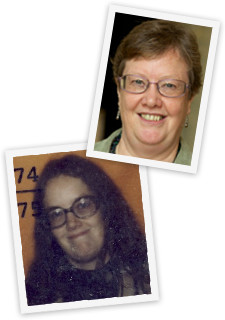
5/6
Wilma Alexander:
Accessibility Advisor
Where did you go to University? My first degree was an MA in Linguistics and English Language from the University of Edinburgh.
What did you enjoy most about higher education? I enjoyed most the discovery of a completely new subject area and some very inspiring tutors including world-leading specialists.
What surprised you the most about higher education? What surprised me most was how difficult some of the study was – I had never been really challenged at school, but University was a whole different level and did require a significant step up in work and intellectual effort.
What one piece of advice would you give students today? While keeping up with your core subjects and assignments is important, try to make time to follow up any byway that interests you.
Wilma Alexander has recently retired from the University of Edinburgh, where she was part of the central eLearning team for over 15 years. During that time she promoted the importance of usable and accessible digital practice, tutoring on the ground breaking Masters in Digital Education, developing online staff training on accessible eLearning and online tutoring skills. Since 2007 she has worked with Epigeum on improving the accessibility features of their courses, and on ensuring content emphasises accessibility and usability where appropriate. Wilma is a Fellow of the Higher Education Academy and has a Masters qualifications in Human-Computer Interaction and Information Science.
Parts of this course have been adapted from the second version of Epigeum's Avoiding Plagiarism course. The second edition of Avoiding Plagiarism was updated by the Epigeum Editorial team, in consultation with:
- Professor Mark Brown, Director of the National Institute for Digital Learning, Dublin City University
- Dr Douglas Halliday, Director of the Multidisciplinary Doctoral Training Centre in Energy, University of Durham
- Dr Helen Lanville, Head of the Department of American and Canadian Studies, University of Birmingham
The authors of Avoiding Plagiarism are:
- Dr Karen Handley, Reader in the Department of Business and Management at Oxford Brookes University.
- Dr Benita Cox, Reader in Operational Research at Tanaka Business School, Imperial College London.
This course will help you to:
- Reflect and build on your personal motivations for attending university
- Prepare for independent learning
- Identify where to go for advice, guidance and support
- Get the most out of your higher education experience.
The diagram below explains the chronology of the course.
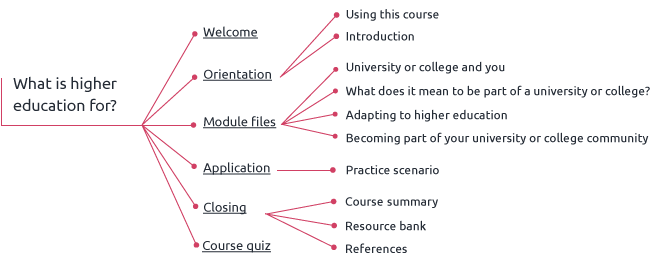
The Academic Success programme has been developed in conjunction with the following institutions:
- Charles Sturt University, Australia
- Dublin City University, Ireland
- Galway-Mayo Institute of Technology, Ireland
- Institute of Technology Sligo, Ireland
- James Cook University, Australia
- Sheffield Hallam University, UK
- Swansea University, UK
- Ulster University, UK
- University of Newcastle, Australia
- University of Sheffield, UK
- University of Sussex, UK
- University of Westminster, UK
- Victoria University of Wellington, New Zealand.
Some of the highlights you'll find in this course include:
- Video interviews with students and staff
- Tips for adjusting to university life
- Practical activities to help you focus on your goals and expectations
- Interactive polls – find out what other students doing this course are feeling about student life!